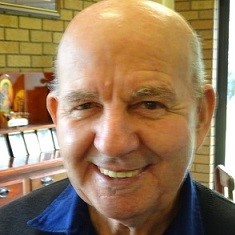Peter MALONE
Broker

BROKER
Korea, 2022, 129 minutes, Colour.
Song Kang-ho, Gang Dong-won, Bae Doona, Ji-eun Lee.
Directed by Kore-eda Hirokazu.
Over several decades, Japanese writer-director, Kore-eda Hirokazu has made quite a number of striking films, including Nobody Knows, Like Father Like Son, Shoplifters.
One of his major interests is family, the young children abandoned in Nobody Knows and having to fend for themselves, the family problems with the Shoplifters. And this is his theme here, abandoned children, couples wanting to have children, and a kind of black market in selling off abandoned children.
Most of the director’s films are set in his Japan but, this time, the location is Korea, in fact, something of a road movie around various locations, cities, countryside, a fair in Korea. And the cast is Korean, especially Song Kang-Ho, promminent in many films including the Oscar-winning, Parasites.
The audience is immediately jolted when a young woman abandons her baby at an institution, the camera focusing on a sign, a lid, Baby Box. Young mothers abandon – and the film often uses the phrase “throwaway” - the babies. The abandoned children are cared for in an orphanage and we see many of them, especially at play. However, the meaning of the title comes into force when we see two men intercept the baby in the Baby Box, delete the video surveillance, and prepare to go on the road, using links to sell off the baby to needy couples. They are “Brokers”.
One is an older man, running a laundry, able to give advice when needed, alienated from his wife, at a meeting with his daughter who does not bond with him. The other is a younger man, working at the orphanage, abandoned himself when a baby, and bearing the resentments all his life. The older man also has a gambling problem and is pursued at times by thugs.
As they go on the road, they are joined by the mother who has second thoughts and returns to find the baby, not attached to it, but growing somewhat attached, young, prostitution, exploited by a married man, defying the advice from an abortion. However, she is somewhat hardened and interested in how much money her baby will sell for. There are various scenes with prospective parents, haggling about prices, wanting better prices, avoiding being caught by the police. There is another human face with them on the road, a young boy from the orphanage, streetsmart, who insinuates himself into the journey.
And the police are after them, an obsessed detective and her offsider, following the van everywhere, even coaching a man and woman to present themselves as buyers. Later, there is a genuine couple, their child stillborn, there being eager to buy this baby.
While the brokers are criminals, as the film goes on, there is a complexity in their characters, criminal intent, but each of them with a deep humanity in their way, making it difficult for the audience to judge them harshly. But the film does end in images of hope, especially for the future of the baby.
A humanistic perspective on a social problem, Korean and universal.
- The work of the director? Japan? Korea? Humane values? Family?
- The Korean setting, the city, the Institute for the babies, the baby box, the interiors, the laundry? On the road through the country, the fair, the venues for meeting clients? The musical score? Korean atmosphere?
- The opening, the baby box, the situation for unwanted children, the woman, putting the baby on the ground, then the baby in the box, Sang-hyun and his laundry, getting the baby, his collaborating with Dong-So? Taking the babies, acting as brokers, selling the babies?
- Sang-hyun and his background, failed marriage, alienation from his wife, the meeting with his daughter, her alienation? Dong-So and his background, abandoned, the effect on him?
- The police, the detective and her associate, anti-brokers, personal investment in the crusade, following the van, plans to trap the brokers, setting up the couple in training them in acting, the failure? The continued travel, the visuals? The interview with the young woman, her story, the setup, betrayals, promises, lesser sentence in jail?
- The travels, the personality of the two men, criminal yet becoming more sympathetic as the film went on? Their plans, the money, the older man and his gambling, debts? Thugs pursuing him? The young man, his prospects?
- The mother, leaving the baby, going to the shops, returning, wanting to see the baby? The background of the father, married, wealthy, his wife and her wanting to have the baby (to bring it up or to sell it)? Her name, the background to her prostitution, the visit to the madam?
- Her joining the group, travelling with them, her age, experience, changing attitudes, dealing with the baby, some bonds? Yet her interest in the money from selling the baby?
- The young boy, from the orphanage, playful, mischief, travelling with the group, the episode in the car wash and the water, going to the fair, fear of heights on the Ferris wheel, being sick? His astute observations, knowing what was going on, his contributions?
- The interview with couples, the criteria for testing whether they were genuine or not, the range of couples and their situations, the false couple, the rehearsals for their performance, failing, badly interpreted by the man? The meeting with the couple who had lost their child? Genuine? But the detectives following them, the arrest?
- The years passing, the detective and her caring for the child, playing in the water, the visit from the mother, her job? Dong-So joining them? And the invitation for Sang-huyen to join them, his observing?
- A humanistic, sympathetic observing of a powerful social issue?
Out of the Blue/ 2022
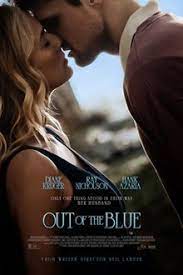
OUT OF THE BLUE
US, 2022, 90 minutes, Colour.
Diane Kruger, Ray Nicholson, Gia Crovatin, Hank Azaria, Frederick Weller, Victor Slezak.
Directed by Neil LaBute.
For audiences who enjoy soap operas – especially if they have their steamy side!
The film was written and directed by veteran Neil LaBute who has made much more substantial films, both serious and satirical, in his past career, especially his very early films, In the Company of Men, Your Friends and Neighbours, The Shape of Things. This one is rather slight in comparison.
Twice the screenplay refers to the novel, The Postman Always Rings Twice, made as a film noir in the 1940s with Lana Turner and John Garfield, remade in 1981 with Jack Nicholson and Jessica Lange. (And the star here, Ray Nicholson, is Jack Nicholson’s son.)
So, this is a love story, an unlikely love story, in the film noir vein. But there is a jaunty tone all the way through, especially with very frequent captions indicating “three days later”, “that night”, “another seven days later”…
At first, Ray Nicholson’s Connor is sympathetic, young, out jogging, a job in the library, friendly with the library assistant. But he does spy Diane Kruger as Marilyn emerging from the surf. He is infatuated and begins an affair, she controlling it, married with an allegedly violent husband, with a stepdaughter. She calls the tunes, phone calls, Connor always responding.
Not hard to guess what is going to happen. Getting rid of Marilyn’s husband. And, that is what happens, no surprise except with our wondering how it will happen. Marilyn, of course, does all the setting up while poor Connor thinks he has it all in control. There is a complication when he meets the stepdaughter and her boyfriend who also turns up in the house at the time of the intended murder.
By this stage, we don’t like Connor at all, not wondering how he could have been seduced, but wondering how he could have been so taken in by Marilyn. There is a further complication when early enough, we find that he has been in jail, for a violent outburst, and that he is on parole – and there is a strangely amusing turn by Hank Azaria as his parole officer, trying to help,, oddball in his ways, but ultimately concerned about him after the murder.
No prizes for the audience in anticipating how it all works out, some sympathy forConnor at the end because of his being so taken in. And, a blend of annoyance and disgust at how Marilyn literally sails out of all the drama unscathed.
Only if you like this kind of thing!
Wish You

WISH YOU
Korea, 2021, 102 minutes, Colour.
Sang Lee, Kang Ye Na, Subin Park.
Directed by Do Joon Sung..
Wish You is something of a romantic story but not in the way that the audience might have immediately expected.
The central character is the young man, looking younger, aged 25, a musician with a group, pianist as well as an arranger, the group playing in the city streets. He has a part-time job in a recording company. Walking through the city, he notices a singer and his musician and stops, gazing. An indication of the direction in which this romantic story will go, homosexuality not criminal in Korea but frowned on.
The musician becomes obsessed with the singer, encountering him a number of times, sometimes contrived, sometimes by accident, having his singing on his phone – and giving this to his boss, who has a place on the record company board, recommending that this man be sought out and given a contract. And the musician is tasked with meeting him and bringing him to a conference for a contract.
The musician lives alone, very reticent, but sometimes strong-minded in his work. The singer, like the musician, is 25 but looks far younger. So, the camera embraces them as an attractive couple, and focusing on the fondness and yearning of the musician.
There are some complications with the audition, the contract, the musician asked to stay with the singer in his mansion, the musician seeing the singer shirtless… But, the treatment of the theme is quite reticent.
There seems to be success, a difficulty with the recording studios making an accompaniment which the singer does not approve of, the musician having his own accompaniment acceptable to the singer.
There is a surprising twist towards the end of the film concerning the singer and his walking out on his contract. Some tension in what the singer will do with his life. However, this is an attractive film and moved towards a happy ending.
- The title, the lyrics of the song, played throughout, plaintiff and yearning? As sung by the singer, heard by the musician, heard by the record company representatives? The tone of the film?
- The Korean setting, the city, homes and apartments, views of the city, the record company offices, musicians in the streets, recording studios? The musical score, the songs, the lyrics, pervading the film?
- The focus on the musician, looking young, aged 25, his skill with the group, playing the piano, in the street, the bond with them? His seeing the singer in the street, fascinated? Gazing? The different encounters with the singer? Going to the restaurant, pretending to look for something? At home in his apartment, the yearning? The video, on his phone, showing the producer, her interest? His presence at the board meetings? The producer offering him a full-time job, her assistant?
- The singer, his friend, producer, his restaurant? Singing in the streets? The recordings? The hopes? His being approached, different producers, decisions? The record company, the invitation, the company watching his video, listening to his music, the head of the department, her hard attitude towards singers? Liking his work? The offer of the contract, the details of the contract, the record company and control? Is agreement?
- The producer, tough, ambitious, with the head of the department, with the musician, offering him the job? Getting him to meet with the singer, their meetings, the decision about the contract, summing someone living with the singer, the choice of the musician, his reaction?
- The musician, packing up, his simple apartment, moving in, discovering the mansion, seeing the singer shirtless and the effect? Accompanying him, the recording sessions? His work at the office, having to do spellcheck’s and spreadsheets? His eagerness to go to the studio?
- The recording studio, the manager, providing an accompaniment, the singer and his hard reaction, walking out? The musician and his accompaniment, the singer liking it?
- On the roof, the musician kissing the singer, the reaction? Not staying the night?
- The difficulty with the singer, his disappearing, his manager and the musician searching for him?
- The twist, his father the head of the company, not wanting his son as a singer?
- The singer at the beach, the water, the possibility of killing himself, his return, the explanation, the musician and the accompaniment, the group and producing his own record after his father me telling the company? The final kiss? The future?
Super Mario Bros. Movie

THE SUPER MARIO BROS. MOVIE
US, 2023, 92 minutes, Colour.
Chris Pratt, Charlie Day, Anya Taylor-Joy, Jack Black, Seth Rogan, Keegan Michael Key, Kevin Michael Richardson, Sebastien Maniscalco, Julia Jelenic.
Directed by Aaron Horvath, Michael Jelenic.
The Super Mario Bros are a major face of the Japanese company (founded in 1889), Nintendo.
Using a quotation from Collider, making a rash assumption about who has played Super Mario Bros: “The face of Nintendo Entertainment and arguably the face of video gaming as a whole, Mario has become one of the most recognized figures in pop culture history since he debuted all the way back in 1981 with the first Donkey Kong game. Since 1981, Mario has appeared in a whopping 200 games, making him one of the most prolific fictional characters of all time. Even those who have never touched a gaming console know exactly who Mario is and exactly what he looks like, which is a claim that not many popular characters can make.”
There have been many people over the decades who really do not know the Super Mario Bros. Reviews in the 1990s saw the live-action version with Bob Hoskins, John Leguizamo, Dennis Hopper. It was a box office failure at the time, still condemned by many, rehabilitated by others.
Now, we have an animated version, highly animated, huge scenes of cosmic menace, domestic scenes of the family in Brooklyn, Princes Peach in the Mushroom Kingdom, the menacing Browser who wants to marry her, the humour of Donkey Kong, battles galore…
So, a film for those millions of fans, not a film for those who are not fans, but high hopes for creating new, definitely younger, fans.
For film buffs on the lookout for what favourite stars appear in, or voice characters for, they are here in plenty, Chris Pratt and Charlie Day, entertaining as the Bros, Anya Taylor Joy is a tough Princess Peach, a feminist Jack Black, a comic Seth Rogan…
Nintendo won’t be sorry that they produced this entertainment.
Pope's Exorcist, The
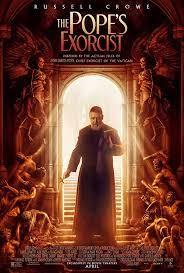
THE POPE'S EXORCIST
US, 2023, 103 minutes, Colour.
Russell Crowe, Daniel Zovatto, Alex Essoe, Laura Marsden, Peter DeSousa-Feighoney, Franco Nero, John Cornell, Ryan O'Grady, Edward Harper-Jones.
Directed by Julius Avery.
The Catholic Church in the cinema headlines once more. Exorcisms againI World audiences have become accustomed to Exorcism films. In fact, it is half a century since The Exorcist was released, 1973. It caused some shocks at the time but Catholic reviewers and audiences took it in their stride.
And since then there have been both sequels and prequels and a regular succession of films, some serious, some horror exercises, some spoofs. So The Pope’s Exorcist arrives with a certain amount of cinema baggage.
The papal exorcist is based on the actual “Pope’s Exorcist”, Father Gabriele Amorth SSP, who wrote many books about his exorcisms, thousands f them. There was a 68 minute documentary by William Friedkin, the director of the original The Exorcist, interviewing Father Amorth and a case, The Devil and Father Amorth in 2017, a year after the Pope’s exorcist died.
World audiences consist of non-believers (including those who do not give God or the devil a second thought) and those who are hostile atheists. Then there the audience that of believers, especially Catholics. The responses quite different.
As regards those for whom God is neither here nor there, maybe there but irrelevant, they will treat this film as another horror movie and like or dislike it accordingly: scares, special effects, some blood and gore…
The setting is 1987, Fr Amorth early in his exorcist career/ministry. The film challenges us concerning Father Amorth as a credible priest. In many ways he comes off well (but we don’t know if the portrayal represents the actual man).
A bearded Franco Nero appears as the Pope, not particularly resembling John Paul II of 1987. Scandinavian actor, Max von Sydow, was serious, very serious, in 1973. But here of all actors, is a very portly Russell Crowe. He speaks Italian and so has an accent, credible enough, when he is asked to speak English. He rides a motor scooter, also has a sardonic sense of humour (and a whiskey swig now and again), joking a lot - and he reminds us that the devil does not like jokes.
At first we might wonder at his methods. But he soon explains (perhaps to our relief) that many of his cases are psychological rather than satanic possession and have to be treated accordingly, with therapy. Father Amorth has noted this in his books.
There is a case focus at the centre of this film, a family, a young boy, possessed (and the expected curses, foulmouthed, contortions…), the devil playing havoc with him, his mother and his sister. But are some more sinister aspects. The setting is Spain, an Abbey in ruins with secrets that Father Amorth, with the local priest, Thomas, praying and attempting the exorcism. In an eerie basement, they find the caged corpse of a Friar who in 1475 was possessed, inaugurating the Inquisition – so that all its subsequent actions were Satan-inspired. It seems that the demon, Asmodeus, has engineered Father Amorth’s presence in order to possess him and work for the destruction of the church from the inside. Horror fans may not notice any of this!
Serious audiences might be interested in The Rite (2012), with Anthony Hopkins and some background of the courses in Rome held for exorcists from around the world.
The Pope’s Exorcist is not essential viewing but has its interest as well as its exorcism-horror conventions.
- The title, audiences interested in possession and exorcism films? And the reference to the Pope?
- The film based on the books by actual Vatican exorcists, Father Gabriele Amorth? His role as an exorcist, his work in the Vatican, the support of the Pope? His number of exorcisms? Actual possessions? Psychological conditions? His life, exorcist at 60 onwards, his work in World War II, Partisan?
- The influence of The Exorcist, exorcism films in the 1970s? Afterwards? Serious, dramatic, heightened horror, parodies? The place of this film?
- Russell Crowe as Father Amorth, age, speaking Italian, accented English? Portly? Not the image of an exorcist, his hat, motorscooter, swigs of whiskey, jokes and sardonic tone? Devout, prayer? Patronage of the Pope, audiences with him? Friendship with Bishop Lumumba? The tribunal, the animosity of Cardinal Sullivan?
- The introduction, the initial case, the family, the little girl praying, bringing the pig, the confrontation with the young man, the typical manifestations of possession, foul-moutned, attack? Father Amorth using psychology? The shooting of the pig? The elimination of the devil?
- The tribunal, the setting of 1987, the congregation of the Doctrine of the Faith, the hostile American Cardinal, rationalist? Father Amorth and the assertion of the presence of evil? Support from Bishop Lumumba? The later experience of Cardinal Sullivan, the Pope and the spewing of blood, Sullivan’s breakdown, retiring to Guam?
- The new case, the introduction of the family, inheriting the Abbey, Spain, the ruins of the Abbey, remote, the workers, the gas leak and the fire, their walking off the job? The plans for renovation?
- The family, Julia, widow, Amy and her surliness, the impact of the death of her husband, one year, Henry, his age, not talking? The arrival, Amy being provocative, not wanting to be there?
- Henry and his symptoms, scratching his face, the violence? Father Thomas, his arrival, reassurances, his being hurled out of the room? Staying for support?
- Father Amorth, his mission to Spain, the motorscooter, arrival, the encounter with the family, the distraught mother, the sister disturbed, the boy and his room,Father Thomas?
- The exorcism procedure, each priest being absolved from their sins, Father Thomas and his revelation, the young woman, his steadfastness in priesthood? Father Amorth, memories of the war, all the partisans being killed, his surviving, accused of cowardice, Rosaria, her mental collapse, suicide, her appearing to Father Amorth?
- Prayer, in Spanish, in Latin, Father Thomas and continued praying, standing guard, his moving towards Henry, Henry biting him? Retreating?
- Father Amorth, the rituals, his box, stole, prayer?
- The Pope in Rome, the ancient documents, the illegible writing, his reading in the baroque Chapel, praying for Father Amorth, identifying, his turn, fainting, the blood, ill in his bed? And the recovery?
- The episodes in the basement, the further discoveries, the skeletons, the documents, the exorcists, the exorcist in the cage, the other authorities, the Inquisition, the various skulls and skeletons? 1475? The premise that the exorcist became possessed, the evil influence on the activities of the Inquisition?
- Father Amorth, the Inquisition, realising that the devil wanted to possess him, to infiltrate the church and destroyed from the inside, the name of the devil, Asmodeus, Father Thomas and his prayer, Father Amorth in the throes of possession, Rosaria appearing, his being saved?
- The family restored, the experience of Henry and his convulsions, violence, foul mouth? The family leaving? And the Abbey being given to the church?
- The credibility of the story, possessions, exorcisms, exorcists, the role of the official church?
Noise/ Belgium
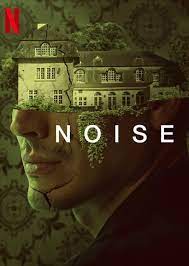
NOISE
Belgium, 2023, 89 minutes, Colour.
Ward Kerremans, Sallie Harmsen, Johann Leysen, Jesse Mensah.
Directed by Steffan Geypens.
Noise is a Belgian film, from Flanders.
The film divided audiences, some finding it boring, others incomprehensible. On the other hand, it has been praised highly for its drama, sense of menace, psychological portrait. This review favours the latter.
It opens ominously with a young woman running into a lake, her husband chasing her, diving into save her but failing. The sequence is played later, as it preys on the mind of the ageing husband, and we see that the scene was more complicated than we understood at the beginning.
Then the film offers a happy family, husband and wife in love, their baby son, moving away from the city to the husband’s father’s country home – near the industrial plant that he managed.
There are two ominous developments. The first focuses on the title of the film, the various noises that affect the son, the crying of his baby and his sometimes desperation (and the audience always apprehensive the something might happen to the child), industrial noises, noises from the imagination. The second focuses on the past of the industrial plant, its closure, its effect on the town, on the various people who work there, the suggestion of deaths and injuries, of cover-up by the authorities.
And the film develops themes, especially with the son trying to work with his father, now in aged care, to solve the mystery of what happened with the industrial plant. And there is always the threat to the child, and some alienation from his wife, a significant presence, with her catering company.
There are some dramatic unfoldings, more menace, touches of violence.
For audiences who enjoy this kind of psychological probing, Noise is very interesting.
- A Belgian film? From Flanders?
- The setting, the remote mansion, the town, the bakery, the market? The industrial plant, vast, interiors? The musical score?
- The ominous opening, the mother, walking into the lake, her husband diving in to save her? The later images, her carrying her son, Pol rescuing his son and not his wife? The aftermath?
- The title, the sound throughout the film, the baby crying, industrial noise, voices, imagining sounds? And the effect on Matthias?
- Matthias and Liv, the baby Julius? The happy couple, inheriting the house from capital, Matthias’s father? Settling in, the hopes? The ideal family? Liv and her catering service?
- Liv going into town, the reaction of the woman in the bakery, the woman at the market? Comments about Pol? His history in the town, the industrial plant, sewage, accidents, intimation of deaths, intimation of cover-ups? Live and bewilderment?
- The visit of Timmi Liv’s brother, support, the moving in, friendship with Matthias? Later helping out, the visits, Matthias turning on him, the visit to the plant, Matthias attacking, Timmi wounded, rescued by the youngsters?
- Matthias, his relationship with his father, the past, his father, wandering from the aged care home, Matthias taking him back, wanting to bond with him? The issue of the plant, the documents, the blueprints, the exploration, the discovery of the body, the clash with Timmi?
- Matthias, absorbed, the scenes with the baby, at night, Liv’s sleeping through, Matthias getting up, rocking the baby, audience apprehension that he would harm his son? The effect of the noise, his becoming more remote, clashing with live?
- The visits to the aged care home, the consultations with his father, his father and the issue of the cover-up?
- The further exploration, the discovery of the bodies, the extension of the plant under the house?
- The dangers, the sense of menace, especially for the baby? The resolution? The truth? A happy future?
Mavka: The Forest Song

MAVKA: THE FOREST SONG
Ukraine, 2023, 90 minutes, Colour.
Directed by Oleh Malamuzh, Oleksandra Ruban.
A fairytale from Ukraine, an animated film based on a Ukrainian poem in three acts, 1911, by Lesya Ukrainka.
At any time, this would be a welcome cinema addition to the many folklore and fairytale variations on screen over the decades. However, it has been five years in the making, released in Ukraine in March 2023, a year after Putin’s invasion. So, it is an encouragement to the people of Ukraine, some moments of morale-boosting as well as entertainment and relief in war times. Worldwide audiences will respond in solidarity.
And, it is something of a fairytale which echoes the atmosphere of invasion. As the film opens, we are treated to the beautiful colours and vitality of the forest, and the powers of the forest. But, a human comes to the forest to ask for help, receives it, but then returns home and sets up a brutal invasion, repelling the forest people, destruction, for human prosperity. Allegory!
But Mavka is a young girl from the forest, delighting in the forest, and with the powers of the forest, chosen to be the custodian of the forest (to the jealousy of three older girls). In the meantime, back in the town, with the humans, there is an enthusiastic young musician, Lucas, playing with the band at the fair, and playing the recorder which delights Mavka, invited to go with the troupe to play in the city, but concerned about his ill uncle.
Though neither of them are exactly royalty, it is clear that Mavka is the Princess equivalent and Lucas, though a commoner, the Prince Charming equivalent.
Then, enter the wicked witch! She is the widow of the initial invader, returning to take possession of the town but, like her Snow White wicked witch equivalent, gazes into her mirror to be the fairest of them all but needs the liquid from a particular tree from the forest. She advertises for workers, Lucas responds, sent on a mission into the forest to find the leaf. She has brought with her an assistant, highly camp in his dress, speaking, manner, and dastardly in his behaviour, especially against Lucas.
On the delight side, there are a range of forest strange creatures, some of them comic, while there is a cute one who loves eating human pies, and a dog who is Lucas’s pet.
And, so, double drama, falling in love with Mavka, and suffering the hostility of the forest people and powers. This we can all enjoy, but not without experiencing a great deal of strife, the wicked witch encouraging the humans to attack again, Mavka and her dilemma of guarding the forest and her love for Lucas…
Obviously, it is going to have a happy ending, and a negotiation for peace (if only in present-day Ukraine). The characters are bright. All the colours are very bright. And the whole production is a reminder of the many fairy tales from the Disney studios over the decades. But this one has its own national tale and heroics.
- A poem from Ukraine, fairytale, traditions, and a 21st-century interpretation?
- The animation, the human characters, echoes of Disney characters, Princess and Prince Charming, Wicked Witch, the design of the characters, the creatures of the forest, the powers, human equivalents, animal equivalents, serious, and comic touches? The musical score?
- The situation in the forest, powers, the touch of the supernatural, the power of nature? The particular characters and their embodiments? The human look of some of those in the forest, especially Mavka, her three sisters? The invasion by the humans after the visit and request for the liquid allegedly for the daughter? The human invasion, fighting, destruction, consequent suspicions?
- Time passing, life in the forest, Mavka, a child of the forest, the three young women and their jealousy? Her being chosen to be the guardian of the forest, the rituals establishing her? Her duties?
- In the town, the farms, the work, shops, the fair, the band, their prospects for going to the city? Wariness of the forest creatures?
- Lucas, position, singing, playing the recorder? His sick uncle? Staying to help him?
- The wife of the invader, her return, her assistant and his camp style, her age, vanity, wanting to establish industry? Yet her wanting the moisture from the leaf from the forest for her vanity? Advertising for work? Lucas and his replying, the mission of the leaf, going into the forest to find it?
- Lucas, the experience in the forest, the creatures, searching for the leaves, his mishaps, the encounter with Mavka, the attraction, their bonding? Difficulties arising, jealousies? Lucas and his return, his uncle recovering?
- The invasion, the rabid humans against the creatures of the forest, the resistance, using magic? Lucas, the camp assistant, spying, trapping him, his eventual release, his dog, going back into the forest?
- Mavka, the situation, the invasion, the prospect of self-sacrifice, her agreeing, sacrificing her love for Lucas, the experience, dread?
- But the intervention of happiness, reward for sacrifice, love, and peace between people of the forest and humans?
See for Me
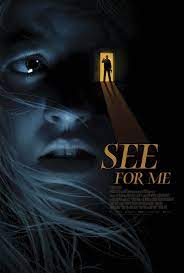
SEE FOR ME
Canada, 2021, 92 minutes, Colour.
Skyler Davenport, Jessica Parker Kennedy, Natalie Brown, Kim Coates, Laura Vandevoort.
Directed by Randall Okita.
There have been a number of thrillers where a blind woman is menaced by intruders. Perhaps the best known is Alan Arkin stalking Audrey Hepburn in Wait Until Dark. There was Mia Farrow in See No Evil/Blind Terror. There was Madeline Stowe as a blind witness in Blink.
Some audiences have declared they have seen it all before – but, does that matter? We might enjoy seeing it again in a varied form.
Legally blind actress, Skyler Davenport, is quite unsympathetic in the central role, Sophie, a champion skier in her teens, her blindness coming on, her wanting to do everything herself, clashing with her mother trying to help, house sitting for a millionaire going through a divorce. The film uses the first half hour to establish Sophie’s blindness, dependence on others, and her fears attempts at independence, her boyfriend Cam guiding her with her phone to see all the details of the mansion. When she inadvertently locks herself out, she connects a company, See for Me, and talks with the representative, Kelly, Jessica Parker Kennedy. She is very sympathetic, has a military background in Iraq, she advises how to get the door open.
After 30 minutes, the intruders arrive, to drill open the safe in the house. There are three, guided by a mastermind on the phone. Sophie hears them and then begins a cat and mouse interaction, her calling the police, and with the help of Kelly. Sophie asks for a cut of the take and this is agreed to, but the police arrive, the officer is killed, Sophie reassesses, gets the gun and, with the guidance of Kelly, shoots the intruders. There is a final twist when the mastermind on the phone is revealed as the millionaire’s husband wanting to get back his cash. Sophie uses her wits, finds the mastermind’s phone, rings it and so he becomes a target for her to shoot.
The lead actress, Skyler Davenport, is legally blind.
There is a positive ending – Sophie wounded, in a wheelchair, wanting to go to the Paralympics, and phoning Kelly!
- Films of blind women being terrorised? Variations on the plot?
- Canadian film, upper New York State settings, homes, the mansion, remote, the wintry countryside? The musical score?
- Sophie, the actress legally blind, her performance? An unsympathetic character? Alienating many audiences? Her determination to do everything herself, her treatment of others trying to help? The consequences for her, locked out, dependent on See for Me help, the police, the intruders? Her stealing the bottle of wine? Her relationship with Cam, his guiding her through the details of the house, his disapproving of taking the wine? Her agreeing to side with the intruders, wanting a share of the money?
- The situation, Sophie, her background, ski champion, eyes, with her mother, clashing with her mother? The contact with Debra, arriving at the mansion, sitting the house, sitting the cat? Cam and his help with the phone camera guiding her through the house? Being locked out? The contact with Kelly, Kelly and her help? Yet wanting to do everything herself?
- The intruders, the safe, Sophie hearing noise, the intruders hearing the noise, Sophie ringing the police, contacting Kelly? The confrontation, her saying she wanted to help, a cut of the money? Phoning the police, telling not to come, the regulations that they should come? The officer, Sophie trying to put her off, coming into the house, almost going, Kelly and her contacting the police, the officers returned, the confrontation, her death?
- Sophie, the intruder from outside, the murder, the effect on the group, Dave the safe, the time for the police to arrive, the phone calls continually from the control, the control and his attitude towards Sophie?
- The cat and mouse, Sophie with the gun, Kelly guiding her, shooting the menacing man? Outside, being chased, Kelly resuming, the menace, the shooting? With Dave, the money, his wanting to take some, Sophie shooting him?
- Rico arriving, the menace, the revelation that he was Debra’s husband, the divorce, wanting the money in the safe? Sophie turning off the lights, the fighting, getting his phone, bringing it, identifying where he was, her shooting him? His rising up, strangling her, the broken bottle?
- The end, Kelly wounded, in the wheelchair, the para Olympics, cam helping her, and the phone call to Kelly?
Mulan/ 2020

MULAN
US, 2020, 115 minutes, Colour.
Liu Yifei, Donnie Yen, Gong Li, Jet Li, Yoson An, Jason Scott Lee, Tzi Ma, Rosalind Chao, Nelson Lee.
Directed by Niki Caro.
Disney’s animated version of this story was very successful, a female hero, a different Princess from the usual Disney stories.
In the 2010s, the Disney studios began remaking their classics in life-action form, ranging from Beauty and the Beast to The Lion King. This version of Mulan was released during the 2020 lockdowns, going to streaming services, not receiving such positive reviews. Comparisons, of course, with the animated version.
But, for those who do not remember or who have not seen the animated version, this is quite a spectacular life-action version. And, for its Asian cast, he relies on some stalwarts from Hong Kong and Chinese industries, Liu Yifei for Mulan, Gong Li and Jet Li, successful both in their homelands and in Hollywood as well as American Chinese veterans, Tzi of Ma, Rosalind Chao, Jason Scott Lee, Ronald Yuan. No difficulties with the cast.
This is a story of a young woman, strong, martial arts, devoted to family, to her father. When the Emperor asks for enlistment in her village, her old father, limping, volunteers. She then disguises herself and volunteers in his stead.
The story covers her disguise and her success as a warrior, the discovery of who she was, the relationship with various soldiers, with the authorities, and her being trusted in battle where she is successful, vindicating her heroic stature and reconciling with her father.
The film was directed by New Zealand director, Niki Caro, who made The Whale Rider but made significant films in the US including McFarland USA and The Zookeeper’s Wife.
- The popularity of the story? Female heroic warrior? The popularity of Disney’s animated version? Decision to make a live action version?
- The settings, Chinese past, the vivid life of the village, streets and shops, community life, the home? The countryside and Mulan is activities? The background of the war, the Imperial Palace, the Emperor and his court? The opposing force, the role of the witch in her transformations? Soldiers training, special guard, support for the Emperor, the battles? These restored? The visuals, sets and decor, costumes? Action and special effects?
- Introducing Mulan, her place in the family, strict father, devoted mother, younger sister – and the fear of spiders? Mulan and her action, skills, tomboy? Her father’s reaction? Her growing up, was writing, weaponry skills, fast reactions and reflexes? But her father wanting her to marry, the visit to the matchmaker, the spider, the upset, broken crockery, the matchmaker disgusted?
- The portrait of the parents, the devoted mother, the very strict father, his past military service, his leg and injuries? Patriarchal, dominating his daughters?
- The portrait of the Emperor, his court, hierarchical? The threat to his empire? The confrontation with his enemy? Having killed his enemy’s father? The transform soldier and his message to the court?
- The enemy, the effect of the single horseman, the gradual increasing number, their advance, the attack, Mulan and her diverging the Lance?
- The introduction of the witch, her background, male domination, her powers, her entering into the merchant and infiltrating the town, transformation into a bird, the discussions with the rebel leader, his dominating her? Her infiltrating the surviving soldier, entry into the Imperial Court and speaking with the Emperor? Her role during the invasion? The multi-birds and the soldiers shielding themselves with shields? The encounter with Mulan, comparisons, the invitation to Malan, her refusal? Her death, her final words of affirmation to Malan?
- The recruiter, the village, one man from every family, the father volunteering, but his falling? Malan, taking the sword and armour, the horse, writing away, disguising herself? With the soldiers, concealing her skills, concealing herself, the issue of showers and Revelation, her bathing? The exercises with Honghui, antagonism, the bathing, her stances, the revelation of her skills?
- The commander, discipline, offenses for execution, for expulsion? The risks for Mulan?
- The battle sequences, the resistance, the attack? The staging of the battles? The wheat and the the birds, the soldiers shielding themselves? Malan, her interventions, creating the avalanche, the effect of the avalanche?
- Revelation, the commander, the condemnation of Mulan? Her message about the threat to the Emperor? Honghui and the others supporting her? Her being invited to lead?
- The Emperor, the battle, Mulan and the confrontation with the leader of the rebels, his death?
- Order restored, her being honoured, but her wanting to return home, apologies to her father, the reconciliation, the gift of the sword from the Emperor, the values including loyalty to family? Celebration in the village, her return to her military role?
- Chinese folklore – the equivalent of a fairytale and a strong heroine?
RIP John Conroy MSC
RIP John Conroy MSC
John Conroy died yesterday at 11:00 pm. Greg McEnnally and the sisters were with him. Greg and the sisters have provided Greg with wonderful spiritual and pastoral care throughout his time at the Little Sisters of the Poor Nursing Home and more so in John’s last days.
John was what was called in those years ‘a late vocation’. He entered the novitiate at age 24.
He made his first profession on February 26th 1960. He was ordained on July 16th 1966 after studies in Canberra and Croydon.
He has spent most of his ministry of over fifty years in parishes, especially in Randwick and in Kensington. He also spent some time in Darwin. In recent years, he has been resident at the Sacred Heart Monastery, Kensington and then moved to the Little Sisters of the Poor in Randwick.

